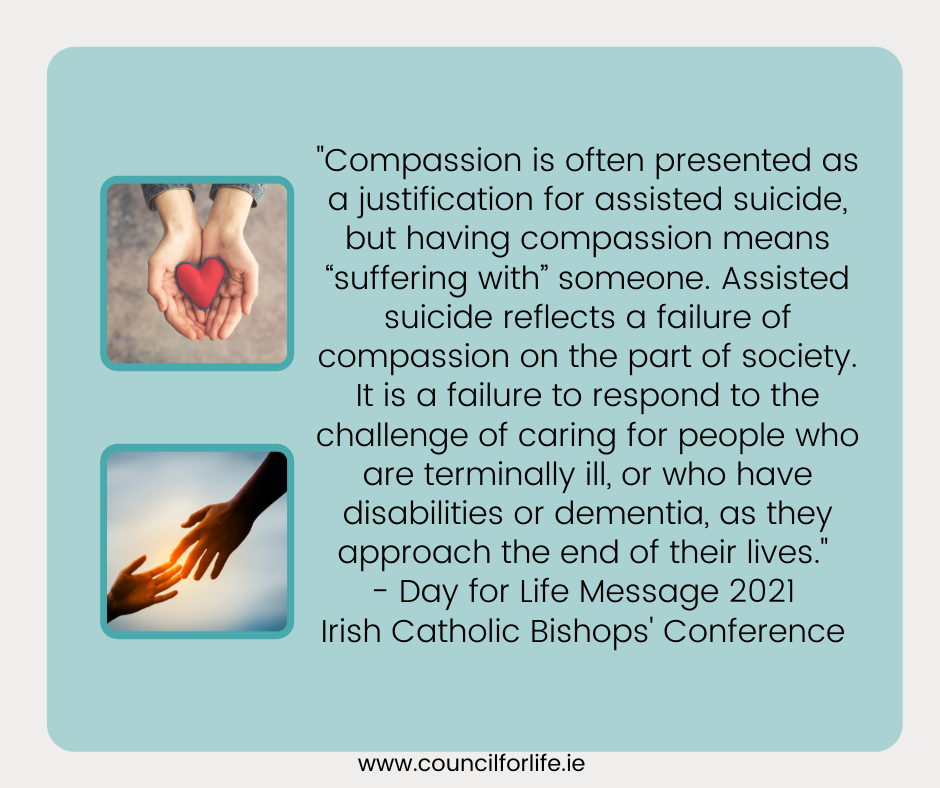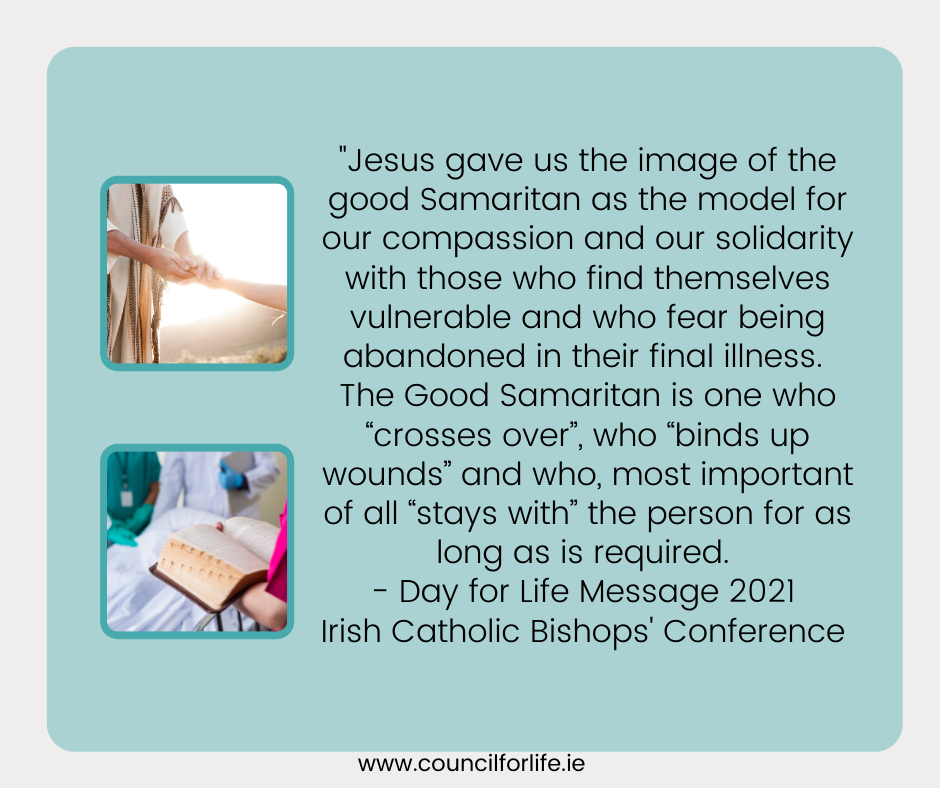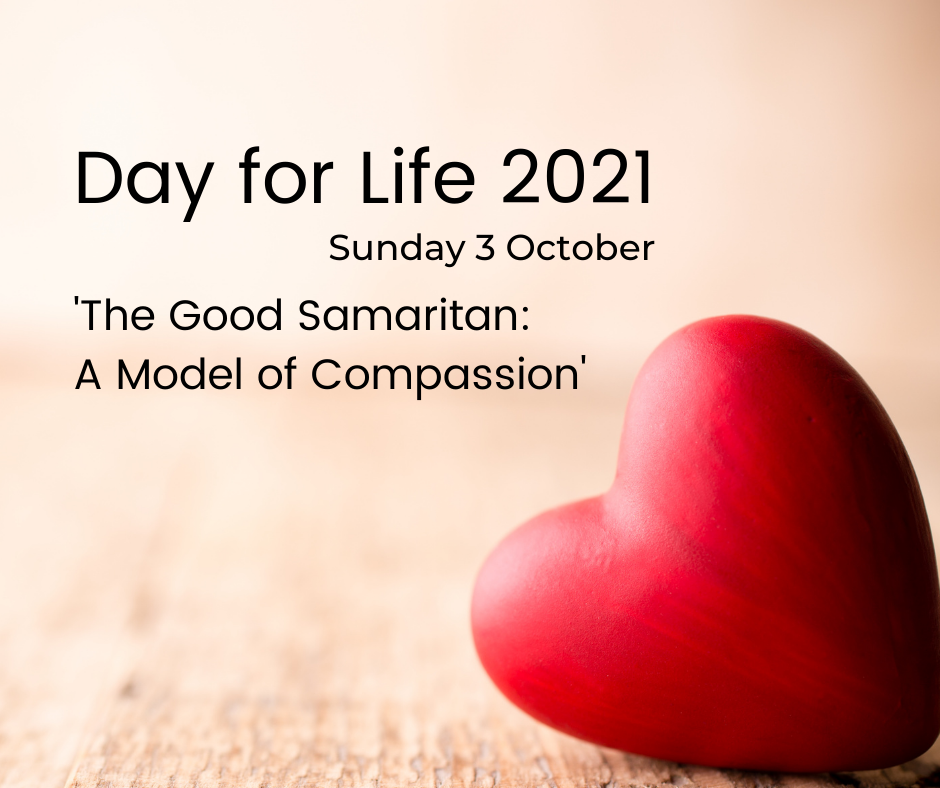About Day for Life
Day for Life is celebrated annually by the Catholic Church in Ireland, Scotland, England and Wales. It is a day dedicated to raising awareness of the meaning and value of human life at every stage and in every condition.
This year’s Day for Lifewill be celebrated in Ireland on Sunday 3 October on the theme ‘The Good Samaritan: A Model of Compassion’.
In the context of the recent proposal to introduce assisted suicide, both in Ireland and the UK, this year’s message invites Catholics to consider a more positive and compassionate response to the care of people who are in the final stages of life.
The Catholic Church’s approach to end of life care is well articulated in the recent Vatican document Samaritanus bonus on the care of persons in the critical and terminal phases of life.
In that document we are reminded that Jesus gave us the image of the good Samaritan as the model for our compassion and our solidarity with those who find themselves vulnerable and who fear being abandoned in their final illness. The Good Samaritan is one who “crosses over”, who “binds up wounds” and who, most important of all “stays with” the person for as long as is required.
See below resources for use in parishes for the Day for Life including this year’s Pastoral Message in plain text and as a PDF download:
Day for Life Message of the Irish Catholic Bishops’ Conference: ‘The Good Samaritan – A Model of Compassion’
The fragility of life and the reality of death have been brought into sharp focus during the Covid-19 pandemic. In Ireland alone, more than 8,000 people have died with Covid-19. Each of these lives is precious and every life matters. With a most amazing spirit of solidarity, the energies of our society – in hospitals, test centres, vaccination clinics, schools, churches, supermarkets and in so many other places – have been directed towards protecting those who were most vulnerable to disease. We have begun to see the fruits of those efforts.
While all of this was going on, the Oireachtas was being asked to discuss legislation to provide for assisted suicide. That particular piece of legislation, thank God, has been rejected by the Oireachtas Committee for Justice on the grounds that it was deeply flawed. The surprising and disappointing thing is that the Oireachtas Committee did not reject the principle of Assisted Suicide and has proposed that Assisted Suicide be discussed further by a special committee, which would report within a specified timeframe.
Compassion is often presented as a justification for assisted suicide, but having compassion means “suffering with” someone. Assisted suicide reflects a failure of compassion on the part of society. It is a failure to respond to the challenge of caring for people who are terminally ill, or who have disabilities or dementia, as they approach the end of their lives. Those who assist with a suicide, whatever their motives, co-operate with the self-destruction of another person. It is one thing when life is allowed to take its natural course, with appropriate management of pain and stress, but is not artificially prolonged by burdensome treatment. It is something else entirely, when one person actively and deliberately participates in ending the life of another.
One feature of the legalisation of Assisted Suicide in other jurisdictions is that, once it becomes lawful, it is then presented and perceived as something good to do. Instead of being surrounded by love and care, people who are already vulnerable and dependent on others due to their illness, are made to feel that assisted suicide would be “the decent thing to do”.
Assisted suicide presumes that there will be somebody with the required skills who is prepared to “assist” in bringing about the death of another person. Wherever assisted suicide is legalised, healthcare professionals are assumed to be the “suitably qualified persons” because they are already licensed to use drugs. It is important to be clear that healthcare professionals are given privileged access to the human body and to drugs for the express purpose of healing and alleviating pain. Any suggestion that they should be expected to assist and, under certain circumstances, actually perform the act that ends the life of another person, is seriously damaging to the ethos and the credibility of the healthcare professions.
 Jesus gave us the image of the good Samaritan as the model for our compassion and our solidarity with those who find themselves vulnerable and who fear being abandoned in their final illness. The Good Samaritan is one who “crosses over”, who “binds up wounds” and who, most important of all “stays with” the person for as long as is required.
Jesus gave us the image of the good Samaritan as the model for our compassion and our solidarity with those who find themselves vulnerable and who fear being abandoned in their final illness. The Good Samaritan is one who “crosses over”, who “binds up wounds” and who, most important of all “stays with” the person for as long as is required.
There is much that we can do to foster a culture of life. We can begin by overcoming our fear of talking honestly about death and dying. Dying is as natural and universal as living and breathing yet our society can make it difficult for people to talk about it. As Christians, of course, our faith in the Resurrection of Jesus will stand to us. For some, if not for all, the support of prayer, and the opportunity to share faith can be of great help.
The Hospice Care Movement fosters a culture of living well until the end. By doing normal things with people who are terminally ill, we can contribute to fostering their sense of being “normal”, which can often be undermined by the “routine of illness”. The experience of presence, companionship and even the acceptance of limitation and dependency, when we take time to appreciate them, can greatly enrich the later stages of life.
The attitude of Jesus towards the sick and towards those who are in any way marginalised, has much to teach us about the value of time spent caring for one another. Many of us, at times, are called to be carers in our own circle of family and friends. Others may find it possible to care for the carers. The bonds of friendship and solidarity that are developed and strengthened in caring relationships, extend beyond the carer and the one who is cared for to the whole of society.
For more material on this theme, please see www.councilforlife.ie.
Day for Life 2021 Messagein PDF format.
Prayers of Intercession
On this Day for Life, we give thanks for the gift of life. We bring before God in prayer, in particular, all who are in the final stages of life and those who care for them.
-
- For all who are trying to come to terms with a decline in their physical or mental capacity and who may be anxious or frustrated – that their distress may be met with understanding and with the kind of care that respects them as persons. Lord hear us.
- For nurses and doctors and, especially, for all who work in end-of-life care – that God’s Spirit may be upon them, directing their words and actions, their decisions and their reactions, so that the healing power of Christ may work through them. Lord hear us.
- For all who are afraid in the face of approaching death, and especially for those who may be inclined to lose hope – that they may be renewed in confidence and courage. Lord hear us.
- For all who work in residential care centres for the elderly – that they may see in each resident the face of Christ. Lord hear us.
- For our legislators and for all who are involved in the development and implementation of public policy – that their decisions and actions may always demonstrate respect for every human life and that they may never use their position to promote or to allow the taking of human life for any reason. Lord hear us.
- For all our family members, friends and neighbours who have died, and for all who have died as a result of COVID-19 – that they may find peace and fulfilment in the company of Mary and of all the saints. Lord hear us.
Father, these are the prayers which we make to you, together with the unspoken prayers of our own hearts. We ask you to hear and answer them through Christ our Lord. Amen.
Prayers
Prayer of John Henry Newman
May God continue to “support us all the day long, till the shades lengthen, and the evening comes, and the busy world is hushed, and the fever of life is over, and our work is done!”
St. John Henry Newman
Canticle of Simeon
At last all powerful master,
You give leave to your servant
to go in peace according to your promise.
For my eyes have seen your salvation,
Which you have prepared for all nations;
The light to enlighten the Gentiles
And give glory to Israel your people
Luke 2: 29-32
Lá Ár mBáis
A Mhaighdean bheannaithe, a Mháthair Dé
A Shoilse ghléigeal ta gan smál
A choinneal shoilseach I láthair Dé
Go raibh tu again lá ár mbáis
Gairdín an Anama (An Sagart)
Dia Romham
Glóir na n-aingeal ós mo chionn,
Ola Chriost ar mo chorp,
Dia go raibh romham agus liom
Is duitse, a Chríost, m’anam bocht
Gairdín an Anama (An Sagart)
Prayer to the Holy Family
Jesus , Mary and Joseph, I give you my heart and my soul.
Jesus , Mary and Joseph, assist me in my last agony
Jesus , Mary and Joseph, make my soul in peace with you forever
Come to Me
Come to me, all you who labour and are burdened, and I will give you rest. Take my yoke upon you and learn from me, for I am meek and humble of heart; and you will find rest for yoursouls. For my yoke is easy, and my burden light.
Matthew 11:28-30
A Prayer for those who are ill
God our Father, we bring before you today those who suffer from illness or disability—those whose lives are profoundly affected by their illness.
When they feel fragile and broken,
remind them that you call them by name
and hold them in the palm of your hand.
When they feel devalued, remind them
that they are made in the image Jesus.
When they are reminded of different times in the past,
lead them to grow in the faith that you love them today, as they are,
in the reality of their lives this day.
When they feel uncertain and fearful about the future,
lead them to that perfect love which casts out all fear.
When situations remind them not of what they can do,
but of what they cannot do, remind them that love never fails.
May all of us, whatever our circumstances, never be so taken up with our own concerns that we do not see or respond to the needs of others, especially those who suffer in our midst. May we live with courage to respond to the challenges that each of us faces. Amen.
(Catholic Health Association of the United States)
ENDS

